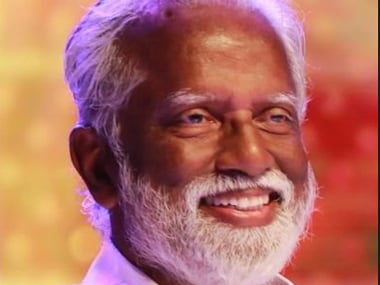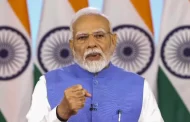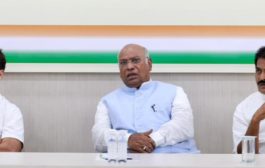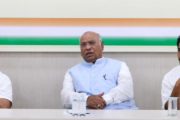Opinion poll surveys predicting chances of an electoral breakthrough for the Bharatiya Janata Party in the Lok Sabha election in Kerala has sparked speculations about chances of cross-voting against the party candidates in constituencies where its winning chances are high.
Speculations are most rife in the Thiruvananthapuram Lok Sabha constituency where the latest AC Nielson-Mathrubhumi News survey has predicted a clear edge for BJP nominee Kummanam Rajasekharan. The party is also expecting possibilities of cross-voting in the Pathanamthitta Lok Sabha constituency where the survey has found a close fight between K Surendran and sitting Congress MP Anto Antony.
Senior BJP leaders including state president PS Sreedharan Pillai alleged that the Left Democratic Front (LDF) which is found trailing behind the two front runners in the two constituencies might resort to cross-voting in favour of the Congress candidates to deny his party a seat in the Lok Sabha.
BJP that won the lone Assembly seat from Nemom segment in the Thiruvananthapuram Lok Sabha constituency in the 2016 Assembly polls, had forced Kummanam, one of the most towering leaders of the party in the state, to quit as Mizoram governor and to enter the fray to give BJP the much-needed electoral breakthrough in the state. Kummanam had shared the concern about cross-voting even before he started the campaign.
Senior party leaders believe that the traditional rivals have been resorting to the unethical practice as they consider BJP as their number one enemy. The party had attributed the defeat of former Union minister O Rajagopal at Thiruvananthapuram by 15,470 votes in the 2014 polls to such cross-voting by the LDF.
Allegations regarding cross-voting came to the fore after the BJP gained the strength to either win the elections or influence the outcome. In the earlier days when the party stood no chance to win the elections, there were allegations of vote trade in exchange of benefits.
This slowly gave way to overt and covert deals for mutual benefit. It was the Congress-led United Democratic Front (UDF) that was mostly at one end of these deals. Rajgopal’s victory from the Nemom segment in the 2016 Assembly polls was termed by the LDF as a result of such a deal.
The Communist Party of India (Marxist) had alleged that the UDF had transferred their votes to Rajgopal in exchange of the BJP votes to defeat their candidate TN Seema in the Vattiyoorkkavu segment. A sharp drop in the UDF votes from 20,248 in 2011 to 13,860 in 2016 lent credence to the allegation. Rajagopal had won the seat by little over 6,300 votes while the Vattiyoorkkavu seat by former state Congress chief K Muralidharan by a margin of 7,622 votes.
This came a quarter century after the first covert deal between the Congress and the BJP ended in a fiasco. The first experiment was attempted in 1991 when the BJP supported the UDF candidate in the Vatakara Lok Sabha constituency in exchange of support to its candidate in Beypore Assembly constituency. The experiment fizzled out as the LDF won both the seats.
The infamous deal which later came to be known as ‘Kolibi’ (Congress-League-BJP) alliance was confirmed by M Ratna Singh, who contested the Vatakara election as an independent fielded by the Indian Union Muslim League (IUML), the second largest constituent of the UDF, in his autobiography entitled Epilogue.
The autobiography published in 2014 revealed that the Congress had struck the deal with the BJP with the nod of the then party president Rajiv Gandhi, who wanted to defeat LDF candidate KP Unnikrishnan, who was his bete noir.
The experiment became a permanent embarrassment for the UDF and BJP with the LDF alleging unholy nexus between the two in every succeeding election. The CPM has come up with such an allegation this time too.
CPM state secretary Kodiyeri Balakrishnan alleged that the deal was struck between the RSS and the Congress to ensure the victory of Kummanam Rajasekharan in Thiruvananthapuram and the UDF candidate in Vatakara. He said that the BJP had fielded weak candidates in five Lok Sabha constituencies as part of the deal.
Congress candidate Shashi Tharoor’s complaint that a section of the Congress election machinery in Thiruvananthapuram was not cooperating with him is seen by the CPM as a vindication of their allegation regarding the unholy alliance.
In a report submitted to the party high command, Tharoor said that over 25 mandalam committees had either stopped working for him or slowed down their activities. Most of these committees are dominated by workers of the Nair Service Society (NSS), a socio-cultural organisation of the upper caste Nair community, which is being wooed by the BJP in the wake of the Sabarimala struggle.
The Tharoor camp feels that some of these mandalam committee leaders may have joined hands with the BJP to help Kummanam. Acting swiftly on Tharoor’s complaint, Mukul Wasnik, AICC general secretary in-charge of Kerala has taken it up with senior leaders like AK Antony, Ramesh Chennithala and Oommen Chandy.
Tharoor, who won the debut election from Thiruvananthapuram by a whopping margin of 99,998 votes in 1999 had faced a stiff challenge from the BJP in his second stint. This time his camp is most worried about the tilt of Nair votes towards the BJP.
Same is the situation in Pathanamthitta, where Anto Antony had witnessed a deep drop in his victory margin in the 2014 polls. The two will find the going tough if there is a Hindu consolidation in favour of the BJP.
Though the poll surveys found LDF candidates are found languishing in the third position in both the constituencies, how far they will sacrifice to keep their bitter enemy away from the Lok Sabha has to be waited and seen as Rahul Gandhi’s entry in the electoral fray in Wayanad has angered them.
The pre-poll survey has also raised fears in the BJP camp about minority consolidation against them. This can tilt the electoral scales since minorities account for 33 percent of the population in Thiruvananthapuram district and 42 percent in Pathanamthitta district.
Sensing the danger, the BJP is trying to pool maximum Hindu votes that went to the LDF and the Congress. The BJP president said that the party will put in place counter strategy to tide over the minority consolidation and cross-voting.
source: Firstpost.com






































